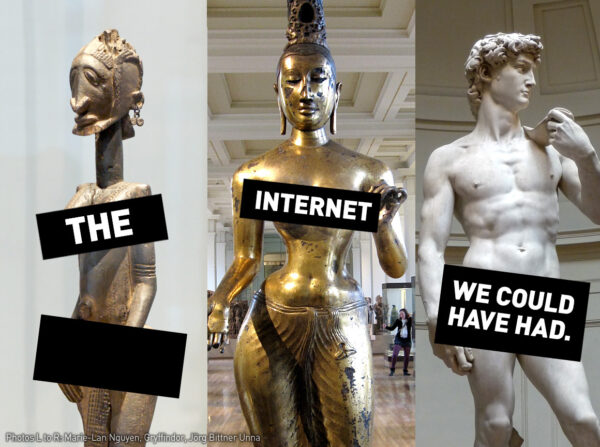ACLU Sends Supreme Court Passionate Defense Of Free Speech in Cyberspace
FOR IMMEDIATE RELEASE
NEW YORK, NY -- Saying that the Internet has "no parallel in the history of human communication," the American Civil Liberties Union today sent the U.S. Supreme Court a passionate defense of free speech and urged the Justices to prohibit government censorship of the Internet.
The ACLU said a broad spectrum of individuals and organizations filed friend-of-the-court briefs in the case, asserting a diverse range of arguments in support of the ACLU's legal challenge to the Communications Decency Act. In a Supreme Court first, one of the groups will be submitting their brief today on an interactive CD-ROM as well as on paper.
"The breadth of speech that plaintiffs and amici in this case engage in demonstrates that content on the Internet truly is as diverse as human thought," said Ann Beeson, ACLU national staff attorney and a member of the Reno v. ACLU legal team. "By imposing a censorship scheme unprecedented in any medium, the CDA would threaten what one lower court judge called the 'never-ending world-wide conversation' on the Internet," she added.
In its brief filed today, the ACLU asserts that the government's efforts to end that conversation amount to a flat ban on constitutionally protected speech.
The ACLU's brief notes that the lower court issued 409 separate findings of fact about the Internet to support their conclusion that the CDA is unconstitutional. Those findings comprehensively show that there is no way for the vast majority of speakers on the Internet to distinguish between adults and minors in their audience.
Thus, the effect of the CDA "would be to reduce all of the communication on the Internet to what is suitable for children, a result that the Supreme Court has repeatedly found unconstitutional," said Christopher Hansen, an ACLU staff attorney and member of the Reno v. ACLU legal team.
The government's brief, filed with the Court on January 20, completely ignores the lower court's strong factual record. Instead, the government attempts to justify the CDA's criminal ban by referring to statements about the Internet made by members of Congress who supported the CDA -- "statements that are directly contradicted by the actual trial record in the case," the ACLU said.
The government also coins a new argument, asserting that the CDA actually protects First Amendment principles by censoring the Internet. A fear of encountering "indecency" online, the government claims, could deter parents and other potential users from exercising their First Amendment right to access the new medium.
"The government's 'fearful parent' argument makes no sense at all," said the ACLU's Beeson. "If it did, controversial material available in libraries and bookstores could be banned simply because parents were fearful of its effect on their children. Furthermore, the government presented absolutely no evidence that any parents or other users were deterred from using the Internet because they were afraid of what they might find." The American Library Association, lead co-plaintiff in Reno v. ACLU, also filed its brief with the Court today on behalf of nearly 30 organizations.
The ALA lawsuit, filed on February 27, 1996, was consolidated with ACLU v. Reno in the successful lower court challenge and again when the Supreme Court accepted both cases for review last November.
Groups filing amicus curiae in Reno v. ACLU include the following:
- Volunteer Lawyers for the Arts, a New York-based organization dedicated to protecting artists' legal rights. Signers-on include filmmaker Robert Altman, playwrights Jon Robin Baitz and Tony Kushner, visual artists Cindy Sherman and Jenny Holzer, and performance artist Karen Finley.
- Schnader, Harrison, Segal & Lewis, a Philadelphia-based law firm representing 25 individuals and organizations. In a Supreme Court first, the firm is providing its brief on a CD-ROM disk that includes color pages of the amici Websites and a hyperlink function that allows the user to go online to link directly to current amici Web pages.
- Reporters Committee for Freedom of the Press, a Virginia-based legal defense organization for reporters. Joining their amicus is the Student Press Law Center.
- ApolloMedia Inc., a San Francisco-based multimedia firm. ApolloMedia is joined by Bay Area Lawyers for Individual Freedom (BALIF), a minority bar association comprised of over 500 lesbian, gay and bisexual members of the Bay Area legal community.
- The Speech Communication Association, which represents over 7000 communication professors nationwide in addition to 26 other countries.
The 20 plaintiffs in Reno v. ACLU are: American Civil Liberties Union, Human Rights Watch, Electronic Privacy Information Center, Electronic Frontier Foundation, Journalism Education Association, Computer Professionals for Social Responsibility, National Writers Union, ClariNet, Institute for Global Communications, Stop Prisoner Rape, AIDS Education Global Information System, BiblioBytes, Queer Resources Directory, Critical Path AIDS Project, Wildcat Press, Justice on Campus, Brock Meeks dba CyberWire Dispatch, the Safer Sex Web Page, The Ethical Spectacle, and Planned Parenthood Federation of America.
Stay informed
Sign up to be the first to hear about how to take action.
By completing this form, I agree to receive occasional emails per the terms of the ACLU's privacy statement.
By completing this form, I agree to receive occasional emails per the terms of the ACLU's privacy statement.




